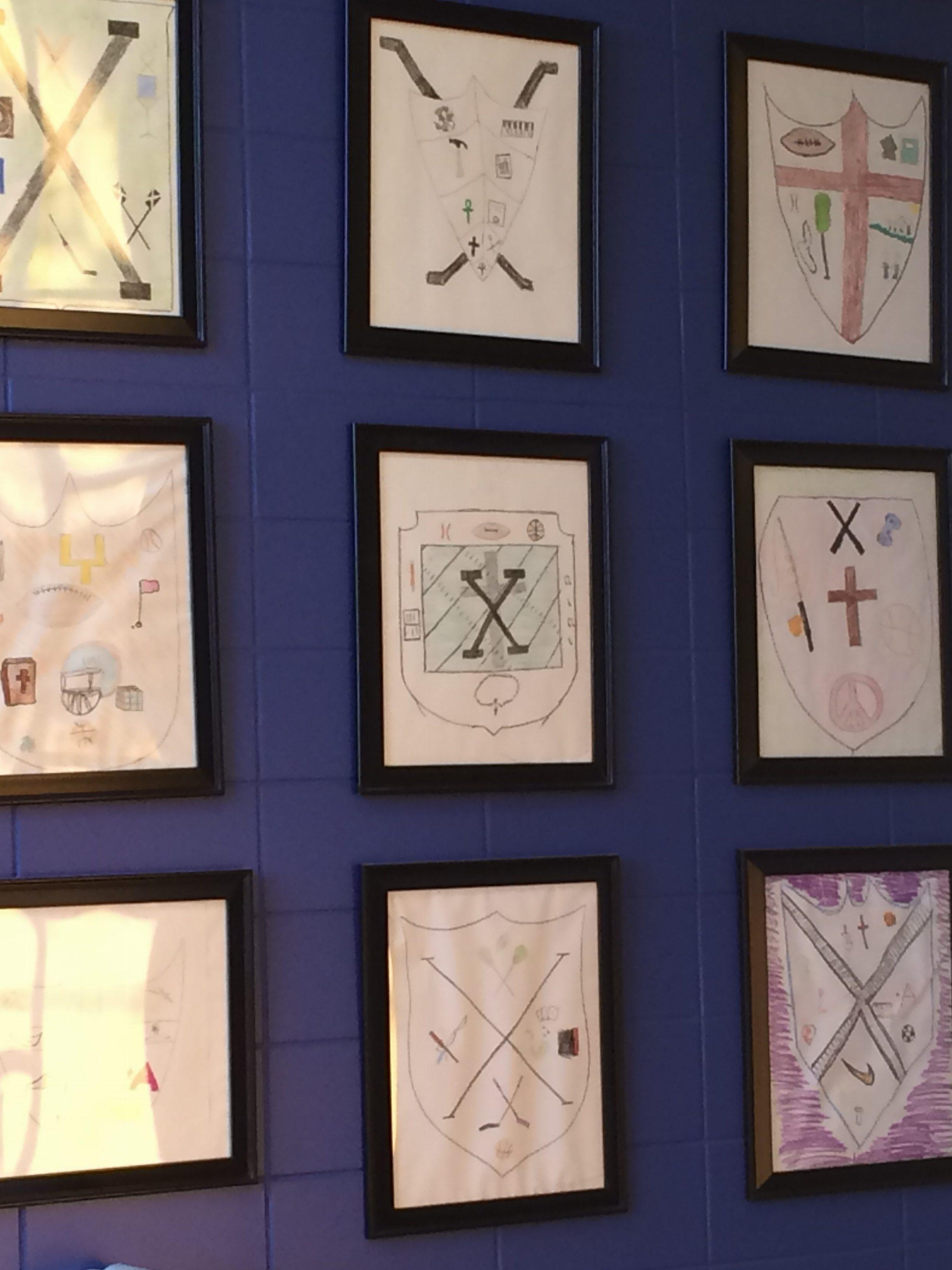The Significance of Sophomore Saturday
November 28, 2016
What is Sophomore Saturday? By this time of year, only a few dozen sophomores have experienced its enlightening effects. Most sophomores, ironically, would sleep better at night if the day didn’t exist at all. Perhaps the source of their dread is its thirteen-hour duration, or its introspective nature. Walk around the school and you might spot drawings titled “Sophomore Saturday shields”— relics of what was achieved on Saturdays past, and representations of what this mysterious day is all about. Fear not, for the basic details of the day can easily be extracted from any faculty member or upperclassman—the latter perhaps casting the day in a more negative light than what may do it justice. If they’re knowledgeable in their retreats, these individuals may tell you that Sophomore Saturday is an event dedicated to sophomores, lasting from 8 A.M. to 9 P.M., and is held three times a year, with sophomores being able to pick one of the three days to attend. During the Saturday, various activities are undertaken with the goal to have students look inwards and examine how they treat others. But, there’s more to Sophomore Saturday than what can be obtained from a passing inquiry, and there’s a tendency to become too caught up on what the day’s like, rather than why it’s there in the first place.
So, in a quest to better inform the student body and quell any of the ill-placed dread some students may have, I sat down with Sophomore Saturday organizers Mr. Bell and Mr. Lyons and fielded a series of questions intent on uncovering the history, purpose, and some tips from the experts themselves on how to make the most of Sophomore Saturday.
Could you go briefly over what Sophomore Saturday is?
Mr. Lyons: “Sophomore Saturday is a mandatory retreat for all sophomores. We hold three of them every year and sophomores have to go on one of them. It’s a retreat that focuses primarily on students’ relationships with God, family, friends, and with themselves. Students will hear talks from other students and they’ll have the opportunity to process what they heard in groups. We also create Shepard’s pies that we deliver up to the local soup kitchen. This is my fifth year at Xavier and I’ve learned that everything we do at Xavier involves prayer, service, and reflection. We try to serve the Xavier community and the larger community outside Xavier and then we spend some time reflecting what that service means to us and to the people that we serve.”
Mr. Bell, you once did Sophomore Saturday when you were at Xavier. How is it different from the Sophomore Saturday that students know today?
Mr. Bell: “The biggest difference between Sophomore Saturday today and the sophomore retreat that I did when I was at Xavier was that we had Sophomore weekend. We’d come in on Saturday morning, just like you guys, end up having a full day of retreat, and then we’d spend the night in the school and get picked up during the day on Sunday. I slept on the floor of Room 114—Mr. Jaskot’s room. That was a long retreat. Sleeping in school and brushing your teeth in the downstairs bathroom was…odd at best. I think the retreat as it is now, lasting for a Saturday, is a positive and probably the biggest change.”
And how did Sophomore Saturday affect the rest of your time at Xavier?
Mr. Bell: “Well, it was different from freshman retreat, because that was a day centered around service and then reflecting on that service, rather than a more traditional retreat experience. Sophomore Saturday [on the other hand] is really the first time that students experience what a retreat is, to take themselves out of society—or out of what they would typically be doing on a given day—and think a little bit more profoundly and a little bit more deeply about their spirituality and how it affects their everyday life. Sophomore Saturday opened my eyes to what a retreat could be. And that lead me to go on to do Junior retreat when I was a Junior and go on XLI with a little bit more of an open mind, because I had that retreat experience from Sophomore Saturday. It really does open your eyes to what a profound retreat experience can be and how it’s different from freshman retreat.”
Now you’re one of the directors/organizers. How does it feel, Mr. Bell, to be looking at it through this administrative angle?
Mr. Bell: “It definitely gives you a different perspective. When you’re a student, you really can’t get past the idea that you’re giving up your Saturday. And at this point I still see that, but I now also see how peer ministers are giving up their Saturday’s and those faculty members who are coming in for just a part of the day or for the whole thing, how they’re giving up their whole Saturday too. And these retreat experiences always really show what it means to be a part of the Xavier community, in a way that went over my head when I was just a student.”
What areas of Xavier’s five values—zeal, compassion, humility, trust, simplicity—are focused on at Sophomore Saturday?
Mr. Bell: “We really try to do all of them. Just by showing up, the Sophomores are trusting that their day is not going to be wasted. Hopefully the talks that they hear from the peer ministers exemplify the zeal of what it means to be a Xavier man by the time of Senior year. You spend some of the time doing service in terms of making Shepard’s pie for Saint Vincent de Paul’s soup kitchen, so [that shows] compassion and humility, in the sense that [making the pies for these people] is a humbling experience. To hear from people who talk about their sophomore experience, whether it’s myself, Mr. Cerreta, or the peer ministers, and then the fact that students have to leave their cellphones at the door—or hopefully at home—is that simplistic, getting back to the basics.”
Mr. Lyons, what exactly are “peer ministers”?
Mr. Lyons: “We have a group of twenty-five or twenty-six peer ministers. They’re seniors who’ve been selected starting at the end of their Junior year to be the prayer, service, and ministry leaders of the school. We will probably have fifteen to twenty of them on a single Sophomore Saturday. They give talks and they lead the sophomore group discussions. They also clean up, arrange tables, and make sure everything is where it needs to be. They cook in the kitchen. The peer ministers really are the ones who are the driving force behind it. We push the buttons, but the seniors are the ones that do most of the work.”
Why do you think it’s important to take Sophomore Saturday seriously?
Mr. Lyons: “It gives you an opportunity to learn who you are as a person and how you interact with other people. That’s done in community, not in isolation. I learn about myself in how I relate to my friends, how I relate to my parents, to God. And at Xavier we don’t want to just educate you in academic subjects, but educate you in who you are. There’s a progression from your freshman year to your Senior year at Xavier and one of the important ones is recognizing that there’s a world outside of just you. So taking Sophomore Saturday seriously, number one, gives you an opportunity to better understand yourself, who you are, and how you relate to the people around you. By the end of the retreat you’ll probably develop a deeper appreciation of the people in your life. And number two, it’s important to take it seriously so that it doesn’t take away from everybody else’s experience. You may not want to be there, but somebody next to you might.”
Finally, how can a person take advantage of Sophomore Saturday?
Mr. Bell: “The best thing to do for any retreat, the best advice I’ve been given is to ‘buy in’. Meaning: when you show up, you’re going to be there, you’re going to be doing things that might take you out of your comfort zone, such reflecting on relationships and thinking and talking about God, spending time in quiet prayer—things that aren’t typical. It’s easy, too easy, I think, to just write it all off as “Well, this is so different, this isn’t something I’m interested in, this isn’t the kind of person I am. I’m not a reflective person, I’m not a spiritual person, I’m not a religious person.” It’s easy to put up those walls, but if you buy in and you recognize “okay this might be something that’s going to make me a little uncomfortable, this might be something that’s going to push me out of my comfort zone,” you’re going to get the most out of it. So, any retreat experience, the first thing I’ll say is: “your retreat experience can be made or broken based on your outlook when you step foot in there.’ It’s what you make it. If you will allow the day to be transformative, it’s going to be transformative. If you go in figuring it’s going to be a waste of time, it’s going to be waste of time for you. So you have to buy in.”
Mr. Lyons: “We always say on retreats that you should participate, don’t anticipate. You know it’s going to be a long day. Live in the present moment. Just accept what you have to do and engage fully into what’s happening. The team-building exercises that we do in the morning, listening carefully to the talks, participating in the small groups, and any other activates that we do…just fully participate and bring everything you have to the table. It’s the students that tend to the resist and come in with some negative ideas with what Sophomore Saturday is that don’t get much out of it. If you start with that open mind and open heart, you can really benefit from Sophomore Saturday.”
As we have seen, Sophomore Saturday has changed throughout the years, but its main focus has always remained the same: to have sophomores acknowledge that the world around them is a dynamic and ever-changing place, and that their actions having long-lasting consequences. The individuals who enter the Saturday with an open mind will be the ones who leave the Saturday having learned something. As a final comment, Mr. Lyons added that many students realize how Xavier has prepared them academically and spiritually only in their final year at Xavier. Hopefully you’re now one step ahead in that realization.

